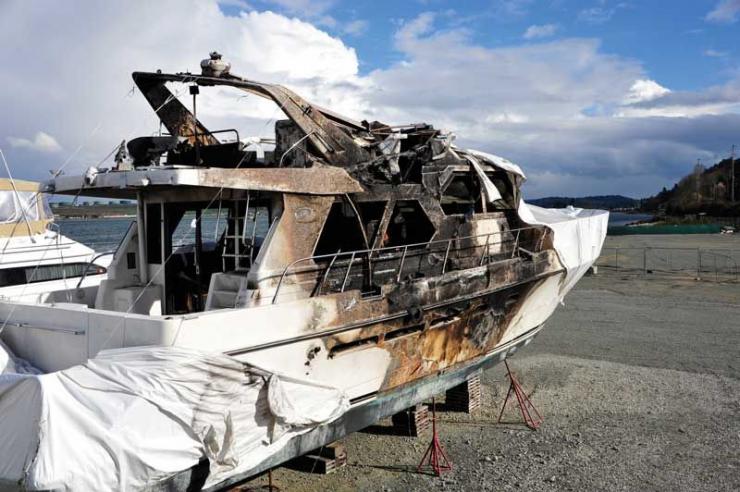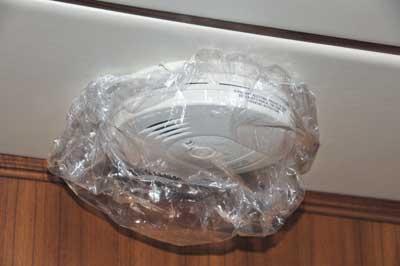Several years ago a fire occurred aboard a small boat in a marina just a few miles from my home in Deltaville. It was late fall; aboard were a father and his young daughter, enjoying one last night out before the season came to an end. To stave off the autumn chill they relied on a space heater, a device which would ultimately prove to be the source of their demise. During the night a fault in the vessel’s wiring led to a fire, which ultimately took both their lives.

While every boat fire gets my attention, this one remains with me because, like so many onboard fire fatalities, it was easily avoidable. First, if the vessel’s wiring had been ABYC compliant, it’s unlikely the fire would have occurred. Second, if the vessel had been equipped with smoke detectors, it’s likely the occupants would have been awakened in time to extinguish the fire or evacuate. They’d be alive today.
With perhaps one exception, you’d be hard-pressed to find a place to lay your head where you aren’t afforded the protection of smoke detection. Today, every hotel, apartment, train, plane, commercial passenger vessel and ferry, along with most homes, are equipped with smoke detectors. The seemingly inexplicable exception is recreational power and sailing vessels. The value of the protection a smoke detector provides is self-evident; smoke nearly always precedes fire, and aboard a cruising vessel, fire, along with flooding, is easily classified as among the worst of scenarios.
Early detection is the key to avoiding disaster in both cases; however, the consequences are certainly more serious where smoke and fire are concerned. If your vessel goes down, you can don a lifejacket and hopefully crawl into a life raft. Few vessels, however, are equipped with fire retardant suits or breathing apparatus. A smoke detector becomes the first and possibly most important line of defense in dealing with the dangers of flame as well as the toxic smoke it’s almost certain to cause when modern boat-building materials burn. Interestingly, it’s also likely to be the least expensive. Once a fire takes hold, fire extinguishers, both portable and fixed, become the next option, one that you’ll want to avoid at all costs. Virtually every fire extinguisher, even the smallest economy models, cost more than most smoke detectors. Smoke detectors are cheap insurance.
The Law and Standards
The Coast Guard, relying on the Code of Federal Regulations (CFR) chapter 46 guidelines, requires that smoke detectors be installed in the sleeping compartments of all small inspected vessels, vessels that carry paying passengers. Regrettably, and this comes as a surprise to many, no such requirement exists for recreational craft; however, that’s no reason to forgo a smoke detector. After all, there’s no requirement that mandates installation of electric bilge pumps, yet few vessels put to sea without them. If the Coast Guard inspected vessel guideline is voluntarily followed, then a smoke detector that meets Underwriters Laboratories standard UL217 is suitable for use aboard your vessel. The National Fire Protection Association document NFPA 302-13.3 “Fire Protection Standard for Pleasure and Motorcraft” calls for adherence to the same UL 217 standard in vessels over 26 feet. From my perspective, any vessel with a cabin in which those aboard may sleep, regardless of size, should be equipped with smoke detectors.

Selection
Most battery-powered, self-contained household smoke detectors have a useful life of between eight and 10 years; some are equipped with batteries that are designed to last for this entire lifespan, making battery replacement unnecessary. Most units alert users when this 10-year time line is nearing its end, referred to as “end of life warning.”
For marine use I recommend a 50-percent safety margin, replacing 10-year units at the five-year mark for instance. Again, for the cost this is still the cheapest smoke-detection and fire-safety insurance you can buy. Because there is no legal mandate for recreational vessels, use of units that don’t necessarily meet the UL 217 standard is not prohibited per se, and in some cases units that don’t meet this standard have highly desirable features that simply cry out for use aboard a cruising vessel. These include those that utilize wireless, RF technology to trigger every smoke alarm installed aboard the vessel. I’ve installed and recommended RF wireless units for several years and know of at least two occasions where the system alerted users to a fire in the engine room or compartment long before it would have otherwise been noticed, and in time for it to be extinguished.
The detection method used for smoke alarms falls into two categories: ionization and photoelectric. In the former case, a very small and slightly radioactive source is used to detect smoke particles, triggering the alarm. Photoelectric detection, on the other hand, uses a light source, which is reflected by smoke onto a light-sensitive panel, which again triggers an alarm. It is my strong recommendation that a detector be chosen that relies either on photoelectric sensing, or one that uses a combination of both photoelectric and ionization technology (this is also the recommendation of “Consumer Reports”). Those that use ionization alone are not well suited for shipboard fire detection. Many household smoke detectors are available as combination units for smoke and carbon monoxide or ‘CO.’ Aboard a boat using these in accommodation spaces makes good sense.
Installation
Whichever units you choose, be sure to install one on both sides of every door in all berthing areas. That is, in the passageway outside a cabin door as well as inside the cabin. With this approach it becomes unlikely that a closed door could prevent an alarm from sensing smoke and sounding the alarm. The aforementioned wirelessly interconnected units are especially valuable in marine applications. If the engine room unit senses smoke, it sounds the alarm in units installed throughout the vessel: in the pilot house, saloon, and berthing areas.
Because the majority of fires that occur aboard recreational boats are electrical in origin, installing smoke alarms behind electrical panels, under dashboards, in lazarettes, and over battery banks also makes good sense. Unfortunately, other than in 120-volt AC versions, hard-wired 12/24-volt DC smoke alarms designed for marine or RV applications are not readily available. We are, therefore, forced, for the time being, to use the internal battery-powered variety.
‘Not a problem,’ you might say, as that’s how the household units are set up. They sound that impossible-to-ignore annoying chirp (the one in your bedroom is guaranteed to begin sounding at 2 a.m.) for weeks when the battery begins to fail, which works just fine. However, most homeowners don’t vacate their homes for weeks at a time, and if the battery happens to go dead while you aren’t aboard for one of those extended periods, or during winter storage, it’s possible you’ll unknowingly return to a non-functioning alarm. Therefore, for these units, it’s critically important that you test monthly, and replace batteries seasonally for all smoke detectors aboard. Is there any good reason to not install smoke detectors aboard your boat? I believe the answer is a resounding “No.”
About the Author: Former boatyard manager, technical writer, and lecturer, Steve D’Antonio, consults for boat owners and buyers, boat builders, and others in the industry. Visit stevedmarine.com for his weekly technical columns.